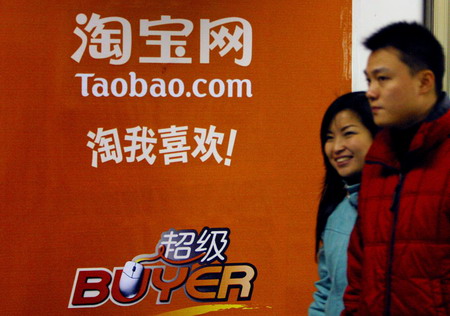Economy
US eyes Chinese Net shoppers
By Chen Limin (China Daily)
Updated: 2010-12-17 09:53
 |
Large Medium Small |
Taobao.com has long been a platform for luxury items purchased abroad to be resold to domestic consumers. Export Today plans to provide logistics services through a partnership with the e-commerce giant and provide US products easier access to the Chinese market. [Photo / China Daily]
Former government official plans to increase access for online trade

BEIJING - While China's booming e-commerce industry has brought massive opportunities for domestic sellers, those outside the country have relatively few opportunities to tap into the world's fastest-growing e-commerce market.
Yet Frank Lavin, the former US under secretary of commerce for international trade, believes this is exactly what his company can cash in on. Export Today, founded by Lavin and four other people, plans to establish a partnership with the Chinese e-commerce giant, Alibaba Group Holding Ltd, to enable businesses in the United States to sell goods in China.
"China is in many ways an exciting market, but many Americans have a limited familiarity with the country so there is an opportunity for a company to play an intermediary role and help US companies in China," said Lavin.
The company aims to link US small- and medium-sized enterprises (SMEs) with Alibaba's Taobao Mall, the largest Chinese business-to-customer shopping site, after launching its service in mid-2011.
Businesses will have to send their products to Export Today's US warehouse, where they will be packed and sent to China through regular sea shipments each week. After they arrive at the company's Chinese warehouse, their details will be posted on Taobao Mall, then when sales orders are made, the goods will be sent to individual buyers in China.
| ||||
Consolidated shipments will enable the company to save 75 percent of the shipping cost for each item, which usually accounts for a large part of the total cost of an international online purchase. Export Today will charge businesses an initial fee and a commission from the sale of items.
"There's certainly room for growth," said Lavin, noting that there are 30 million registered companies in the United States, and just 1 percent of those are exporters. He added that many US companies, especially SMEs, that don't have branches in China usually find it hard to access the country's e-commerce market.
However, Export Today is not the first company to bring US products to China. Many Taobao sellers hire people who study or work in the US to buy goods there and send them back to China. It is a common practice, especially for Taobao stores that sell cosmetics and luxury products, as prices of these goods are usually lower in the United States than in China.
Compared with this type of seller, Lavin said his company is "open to all segments and sectors". Taobao, with more than 300 million registered users, has also been stepping up efforts to include more international sellers in its current portfolio. Earlier this year, it joined with Yahoo! Japan Corp to launch two online platforms to allow vendors to sell in each other's markets. Now Taobao users can shop on the website's Japan Mall to buy goods from Japan.
China has seen more and more e-commerce companies being established in recent years, with total e-commerce sales volumes surging to 3.6 trillion yuan ($530 billion) in 2009.
Export Today will begin a campaign in about 40 US cities next year in a bid to attract SMEs join it.



